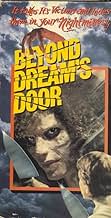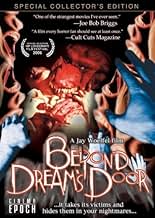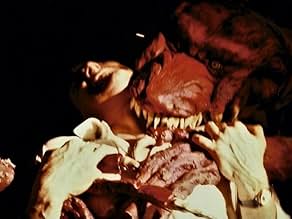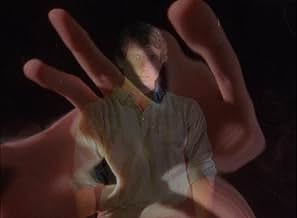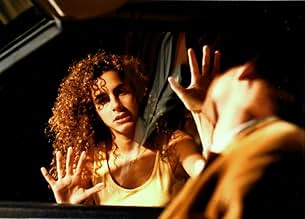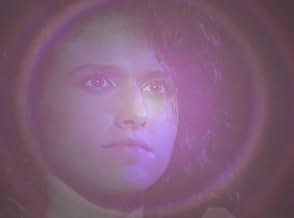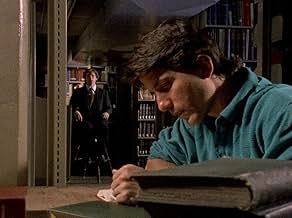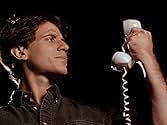Ajouter une intrigue dans votre langueBen hasn't been able to dream since the deaths of his parents, but as he attempts to make human connections, his nightmares begin to spill over into all of their waking lives.Ben hasn't been able to dream since the deaths of his parents, but as he attempts to make human connections, his nightmares begin to spill over into all of their waking lives.Ben hasn't been able to dream since the deaths of his parents, but as he attempts to make human connections, his nightmares begin to spill over into all of their waking lives.
- Réalisation
- Scénario
- Casting principal
Marjorie Whitney
- Mrs. Oxel
- (as Marge Whitney)
Raymond Michael Bell
- Dead Dreamer
- (as R. Michael Bell)
Avis à la une
Beyond Dreams Door was essentially the most important film in my young movie-watching life, and for good reason, as it represents everything a film should be - dynamic, experimental and most importantly, intelligent. It also yielded the notion, at least to me, that low-budget independent cinema was where the true passionate visionaries existed, people like Jay Woelfel.
Utilizing elements from popular culture and new wave French cinema and working with a limited budget and a mostly in experienced cast and crew, Jay Woelfel managed to craft a stylish cerebral film that dares to takes chances like few films before it were willing to do.
Bypassing the conventional formula exercised in most other horror films, Woelfel chooses to operate in a non-linear format (remember, this pre-dated Pulp Fiction and Reservoir Dogs by a few years) while also utilizing Hitchcock's various laws of systematization, specifically the use of colors, and the lighting schemes of the various characters. Add to this various other subtle factors that fail to stand-out during the initial viewings, but become quite prominent the more the film is examined, and, in the end, what you are left with is an important film, that is essentially way way ahead of its time.
The movie concerns a shy Ohio Psychology student Benjamin Dobbs, played by Nick Baldasare, who finds himself plagued by a series of horrific inter-connecting nightmares, after he unknowingly agrees to be apart of a dream research experiment. Ben's initial sense that the dreams might have something to do with the untimely loss of his parents quickly fades as they become increasingly stranger and more terrifying. Unable to cope, Ben seeks help in the form of the various on-campus teachers. His psychology professor Dr. Noxx, played Norm Singer, is his first obvious choice, and Noxx easily embraces Ben's pleas for help as something real. After looking into it, the two come upon a notation in a book, and a case history of another man named D.F. White, that seems to point definitively to the existence of the very things Ben has been dreaming about. Ben quickly discovers the 'things' in the dream realm aren't happy with the sudden Earthbound knowledge of their reality, and quickly take it upon themselves to get the evidence back any way they can. Woelfel makes a point to not render any religious allusions, and the doorway, and what lies beyond, remains vague enough for the viewers to decide for themselves what 'the beyond' actually is.
As the film unfolds, we also note that the narrative changes hands, along with the usage of colorful composition, as Ben passes on knowledge of his curse to the various people he asks for help. The second person to get swallowed up in Ben's nightmares is a teaching assistant Eric Baxter, played by Rick Kesler, who early on is posed a question by Noxx about what he would do if confronted with a life or death question -- and through the course of the film, is allowed to truly answer it. Baxter's initial reasons for helping Ben, and his later insistence that "It's not my problem" point to a screenplay not constructed to fit a formula, rather, the real actions of a three dimensional character. Also aiding Ben on his quest for answers is D.F. White (Daniel White) who died nearly twenty years earlier, and appears to him in the form of a ghostly apparition, or guardian angel, as one friend in college put it. The enigmatic White offers up cryptic words of advice, while leading Ben through the land of the dead and into the proverbial "light".
Visually the film is stunning, and the usage of color as a means of depicting the various character's motivations, is amazing. Personally, it was the first time I had ever seen it used before in film. Woelfel's insistence on telling the story in a non-linear format means a lot of jumping around, back-tracking, and various other things that will make for fun multiple viewings. Woelfel also avoids spoon-feeding his audience. Rather than pointing out the obvious, he allows the viewer to make up their own mind about what they are seeing. In my opinion, the film is much more effective because of this fact. The musical score, also composed by Jay Woelfel, is very good as it helps to add some genuine atmosphere to the film.
A few people have complained that the acting was stiff, but I felt it fit perfectly with the tone of the film, which is easily one of the more somber pieces one is likely to see. The special effects were lacking for the most part, but that doesn't take anything away from the piece as it becomes abundantly clear that this film is not about the boogeyman-in-the-closet but rather the psychology behind the boogeyman-in-the-closet.
Beyond Dreams Door is a cult film that has earned its status. It garnered much discussion and many long debates from my various friends in college, each with a differing theory one what, or who, Benjamin Dobbs is, and what actually lied beyond 'The Beyond'. I personally believe that Beyond Dreams Door should be mandatory viewing by anyone with a true interest in film. I highly recommend it.
Low-budget film-making at its absolute best!
Utilizing elements from popular culture and new wave French cinema and working with a limited budget and a mostly in experienced cast and crew, Jay Woelfel managed to craft a stylish cerebral film that dares to takes chances like few films before it were willing to do.
Bypassing the conventional formula exercised in most other horror films, Woelfel chooses to operate in a non-linear format (remember, this pre-dated Pulp Fiction and Reservoir Dogs by a few years) while also utilizing Hitchcock's various laws of systematization, specifically the use of colors, and the lighting schemes of the various characters. Add to this various other subtle factors that fail to stand-out during the initial viewings, but become quite prominent the more the film is examined, and, in the end, what you are left with is an important film, that is essentially way way ahead of its time.
The movie concerns a shy Ohio Psychology student Benjamin Dobbs, played by Nick Baldasare, who finds himself plagued by a series of horrific inter-connecting nightmares, after he unknowingly agrees to be apart of a dream research experiment. Ben's initial sense that the dreams might have something to do with the untimely loss of his parents quickly fades as they become increasingly stranger and more terrifying. Unable to cope, Ben seeks help in the form of the various on-campus teachers. His psychology professor Dr. Noxx, played Norm Singer, is his first obvious choice, and Noxx easily embraces Ben's pleas for help as something real. After looking into it, the two come upon a notation in a book, and a case history of another man named D.F. White, that seems to point definitively to the existence of the very things Ben has been dreaming about. Ben quickly discovers the 'things' in the dream realm aren't happy with the sudden Earthbound knowledge of their reality, and quickly take it upon themselves to get the evidence back any way they can. Woelfel makes a point to not render any religious allusions, and the doorway, and what lies beyond, remains vague enough for the viewers to decide for themselves what 'the beyond' actually is.
As the film unfolds, we also note that the narrative changes hands, along with the usage of colorful composition, as Ben passes on knowledge of his curse to the various people he asks for help. The second person to get swallowed up in Ben's nightmares is a teaching assistant Eric Baxter, played by Rick Kesler, who early on is posed a question by Noxx about what he would do if confronted with a life or death question -- and through the course of the film, is allowed to truly answer it. Baxter's initial reasons for helping Ben, and his later insistence that "It's not my problem" point to a screenplay not constructed to fit a formula, rather, the real actions of a three dimensional character. Also aiding Ben on his quest for answers is D.F. White (Daniel White) who died nearly twenty years earlier, and appears to him in the form of a ghostly apparition, or guardian angel, as one friend in college put it. The enigmatic White offers up cryptic words of advice, while leading Ben through the land of the dead and into the proverbial "light".
Visually the film is stunning, and the usage of color as a means of depicting the various character's motivations, is amazing. Personally, it was the first time I had ever seen it used before in film. Woelfel's insistence on telling the story in a non-linear format means a lot of jumping around, back-tracking, and various other things that will make for fun multiple viewings. Woelfel also avoids spoon-feeding his audience. Rather than pointing out the obvious, he allows the viewer to make up their own mind about what they are seeing. In my opinion, the film is much more effective because of this fact. The musical score, also composed by Jay Woelfel, is very good as it helps to add some genuine atmosphere to the film.
A few people have complained that the acting was stiff, but I felt it fit perfectly with the tone of the film, which is easily one of the more somber pieces one is likely to see. The special effects were lacking for the most part, but that doesn't take anything away from the piece as it becomes abundantly clear that this film is not about the boogeyman-in-the-closet but rather the psychology behind the boogeyman-in-the-closet.
Beyond Dreams Door is a cult film that has earned its status. It garnered much discussion and many long debates from my various friends in college, each with a differing theory one what, or who, Benjamin Dobbs is, and what actually lied beyond 'The Beyond'. I personally believe that Beyond Dreams Door should be mandatory viewing by anyone with a true interest in film. I highly recommend it.
Low-budget film-making at its absolute best!
Hopefully Jay will get this film re-released. I personally very much enjoy it. It has a certain quality that most modern horror films do not have--the ability to watch it more than once or twice and still have it perk your interest. A film doesn't have to have dazzling modern special effects or top Hollywood actors in it to be good. What I look for in a film is an interesting story and an overall enjoyable viewing experience. This film certainly meets that criteria. I came across this film in an independent video store that (sadly) has closed down a few years ago because they were bought out by a large chain. Support your local independent video stores and support independent film!
College student, Ben, has been having problems with his frightening dreams, but they only get worse and start to take over his entire life and the lives of those around him.
For a low budget, regional horror film without a lot of resources, Beyond Dream's Door is jaw-droppingly well made with an almost David Lynch-ian quality at times with some really great creature and makeup effects. The acting is a mix of good, bad, and lobotomized, but it's the script that's the film's biggest downfall and kills a lot of goodwill built up by the imagination on display elsewhere. The narrative does feel like a dream in the sense that nothing really ever gels and things just happen without any explanation. It's intriguing for 20 minutes or so, but after that, you start hoping there might be a little bit more to it.
For a low budget, regional horror film without a lot of resources, Beyond Dream's Door is jaw-droppingly well made with an almost David Lynch-ian quality at times with some really great creature and makeup effects. The acting is a mix of good, bad, and lobotomized, but it's the script that's the film's biggest downfall and kills a lot of goodwill built up by the imagination on display elsewhere. The narrative does feel like a dream in the sense that nothing really ever gels and things just happen without any explanation. It's intriguing for 20 minutes or so, but after that, you start hoping there might be a little bit more to it.
I love seeing low-budget and NO-budget films rise above their limitations to succeed in becoming something more than merely watchable. "BEYOND DREAM'S DOOR" is such a film, presenting an intelligent and engaging story with resourcefulness and creativity. Sure, some of the effects are on the hokey side(but wonderfully gross), and the acting is expectedly amateurish...big deal. Don't let forgivable flaws hold you back from enjoying this wild, surreal tale of a young man being haunted...and hunted...by his childhood nightmares, both in sleep and awake. He's neither the first, nor the last to endure this torment...he's simply "next".
Seven out of ten stars...a shining example of just how far enthusiastic, imaginative filmmakers can stretch a thin dime.
Seven out of ten stars...a shining example of just how far enthusiastic, imaginative filmmakers can stretch a thin dime.
I found this to be pretty enjoyable. I could see how people might be frustrated by the uneven monster and gore effects. Sometimes they're pretty good, and sometimes (particularly when they show too much) they're pretty cheesy. Given how much of the movie is composed of nightmares, or nightmares intruding into reality, the way things look can be blamed on the dreams.
The story isn't clear from the start, since the movie starts off with a dream within a dream (or maybe even a layer or two beyond that). It becomes clear that the main character, Ben Dobbs, is a college student who after years of not remembering his dreams, is now having a series of nightmares. Each one picks up where the previous left off, more or less. He finds that when he tells people about his dreams, they start seeing them too, even when they're awake.
There's one dream sequence involving someone going into a basement, and finding a figure facing the wall in a corner, and then the camera retreating in a shaky hand-held fashion that I wonder if it influenced a certain other movie....
The video box claimed the movie was inspired by H.P. Lovecraft (though not based on anything by him specifically). I can sort of see that, with some of the stories of his that deal with dreams, and also his poetry. There's a poem recited in the movie from which the title comes.
I liked it and I'd be curious the see the DVD which may be coming out this year.
The story isn't clear from the start, since the movie starts off with a dream within a dream (or maybe even a layer or two beyond that). It becomes clear that the main character, Ben Dobbs, is a college student who after years of not remembering his dreams, is now having a series of nightmares. Each one picks up where the previous left off, more or less. He finds that when he tells people about his dreams, they start seeing them too, even when they're awake.
There's one dream sequence involving someone going into a basement, and finding a figure facing the wall in a corner, and then the camera retreating in a shaky hand-held fashion that I wonder if it influenced a certain other movie....
The video box claimed the movie was inspired by H.P. Lovecraft (though not based on anything by him specifically). I can sort of see that, with some of the stories of his that deal with dreams, and also his poetry. There's a poem recited in the movie from which the title comes.
I liked it and I'd be curious the see the DVD which may be coming out this year.
Le saviez-vous
- AnecdotesThe producers had formerly been students at Ohio State University. In an effort to save funds and get the movie made, they talked the professor into letting his current students crew the film as part of a class project, which also provided them with access to locations on the campus. Post-production was done elsewhere to ensure the school couldn't attempt to claim ownership of the film.
- GaffesA moment before Eric throws Ben out of the house, a boom mic dips into the frame.
- Crédits fousBeyond Dream's Door is a work of fiction and bears no similarities to real characters or events in your world at any point in the past, future or anywhere in between.
- Versions alternativesWhen the film was released on DVD in 2006 it was a director's cut with a new 5.1 sound mix. This version runs shorter than the original VHS release. The VHS version includes a scene with Julie in a phone booth, seemingly frustrated not being able to get a call through and hanging up the phone. The director's cut restores the original scene, in which she had a conversation with Eric. Later in the VHS version, Eric had a lengthy dream sequence that was removed from the director's cut. This was actually the unrelated short film Come to Me Softly (1988), which had been inserted into the movie to pad the running time at the behest of the distributor. The short was included as DVD and Blu-Ray extra, plus the director uploaded it to his YouTube channel.
- ConnexionsEdited from Come to Me Softly (1988)
Meilleurs choix
Connectez-vous pour évaluer et suivre la liste de favoris afin de recevoir des recommandations personnalisées
- How long is Beyond Dream's Door?Alimenté par Alexa
Détails
- Date de sortie
- Pays d’origine
- Sites officiels
- Langue
- Aussi connu sous le nom de
- За дверью сна
- Lieux de tournage
- Société de production
- Voir plus de crédits d'entreprise sur IMDbPro
Box-office
- Budget
- 40 000 $US (estimé)
Contribuer à cette page
Suggérer une modification ou ajouter du contenu manquant


